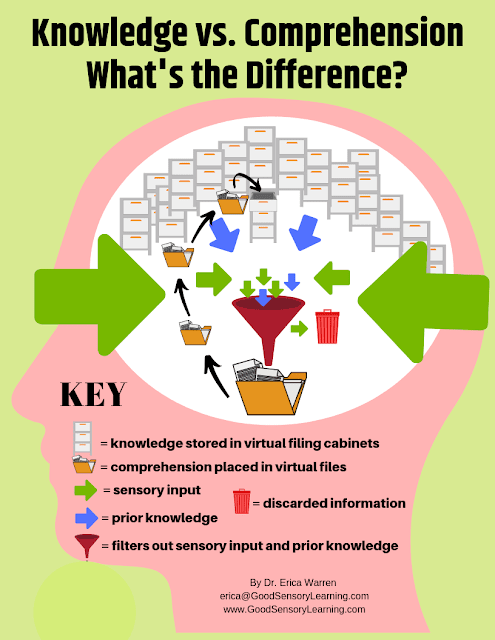This week I wanted to tell you about my online store, Good Sensory Learning. I’m Dr. Erica Warren, and I established this site so I could share all the materials that I have created over the last 20+ years as a learning specialist and educational therapist. When I first began my private practice, Learning to Learn, I had great difficulty finding fun and multisensory materials for my students that were effective and engaging. So back in 2005, I made it my mission to design and distribute high-end, remedial products as well as memorable, motivating lessons that bring delight to learning. If you would like to try a free sampling of my activities , CLICK HERE . How Are the Products Organized at Good Sensory Learning? You can download my Free Printable Catalog or you can browse the site using the grey “search all products” bar in the top right of any page with keywords such as dyslexia, working memory, and executive functioning. What’s more, drop down menus in the red banner allow you t...
Although some may think that knowledge and comprehension are interchangeable, in fact, they are distinct and work together in a sequence. First we must comprehend information, and then it is stored as knowledge. When we access knowledge from long-term memory,it is comprehended again when that information is used to understand something new. But what exactly is knowledge and comprehension?
Knowledge Vs. Comprehension:
Knowledge is the stored, conscious, and accessible information/memories in the brain. Knowledge is not stored in just one part of the brain, but is widely distributed throughout the cortex. Research suggests that there are 4 types of knowledge:
It consists of a complex process that involves knowledge, experience, thinking, and learning.
How Can I Improve Comprehension?
If you are interested in cognitive tools that can exercise and strengthen comprehension. Come review my cognitive remedial and braining training publications at Good Sensory Learning.
What About Reading Comprehension?
Reading comprehension is the ability to process text, understand its meaning, and to integrate with what the reader already knows. To learn more about reading comprehension and strategies to improve it, come read my blogs:
Knowledge Vs. Comprehension:
Knowledge is the stored, conscious, and accessible information/memories in the brain. Knowledge is not stored in just one part of the brain, but is widely distributed throughout the cortex. Research suggests that there are 4 types of knowledge:
- Factual knowledge are facts stored in long term memory.
- Conceptual knowledge the awareness of concepts stored in long-term memory.
- Procedural knowledge is the knowledge exercised in the performance of a task or the necessary steps to complete a task.
- Metacognition is the awareness of one’s own cognition.
It consists of a complex process that involves knowledge, experience, thinking, and learning.
How Can I Improve Comprehension?
If you are interested in cognitive tools that can exercise and strengthen comprehension. Come review my cognitive remedial and braining training publications at Good Sensory Learning.
What About Reading Comprehension?
Reading comprehension is the ability to process text, understand its meaning, and to integrate with what the reader already knows. To learn more about reading comprehension and strategies to improve it, come read my blogs:
- Reading Comprehension Problems: 4 Causes and 12 Solutions
- How Can I Improve My Reading Speed and Comprehension?
- Excellent Reading Comprehension: Developing the 3 Core Cognitive Skills
- Boost Reading Comprehension By Exercising Visualization Skills
Cheers, Erica
Dr. Erica Warren is the author, illustrator, and publisher of multisensory educational materials at Good Sensory Learning and Dyslexia Materials. She is also the director of Learning to Learn and Learning Specialist Courses.
· Blog: https://learningspecialistmaterials.blogspot.com/
· YouTube Channel: https://www.youtube.com/user/warrenerica1
· Podcast: https://godyslexia.com/
· Store: http://www.Goodsensorylearning.com/ & www.dyslexiamaterials.com
· Courses: http://www.learningspecialistcourses.com/
· Newsletter Sign-up: https://app.convertkit.com/landing_pages/69400
Dr. Erica Warren is the author, illustrator, and publisher of multisensory educational materials at Good Sensory Learning and Dyslexia Materials. She is also the director of Learning to Learn and Learning Specialist Courses.
· Blog: https://learningspecialistmaterials.blogspot.com/
· YouTube Channel: https://www.youtube.com/user/warrenerica1
· Podcast: https://godyslexia.com/
· Store: http://www.Goodsensorylearning.com/ & www.dyslexiamaterials.com
· Courses: http://www.learningspecialistcourses.com/
· Newsletter Sign-up: https://app.convertkit.com/landing_pages/69400


Comments
Post a Comment